
-
 BMW reports rising profitability, shares jump
BMW reports rising profitability, shares jump
-
Bolivia Supreme Court orders release of jailed ex-president Jeanine Anez
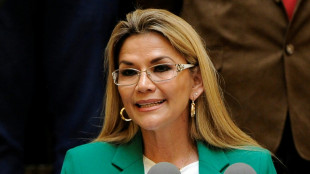
-
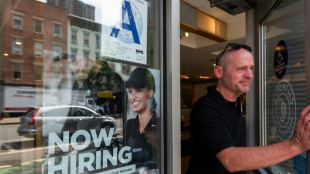 Wall Street stocks rise after positive jobs data
Wall Street stocks rise after positive jobs data
-
'Hostage diplomacy': longstanding Iran tactic presenting dilemma for West
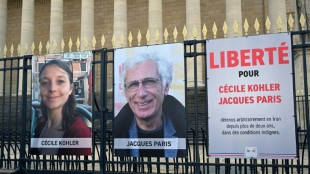
-
 Rybakina stays perfect at WTA Finals with win over alternate Alexandrova
Rybakina stays perfect at WTA Finals with win over alternate Alexandrova
-
Le Garrec welcomes Dupont help in training for Springboks showdown

-
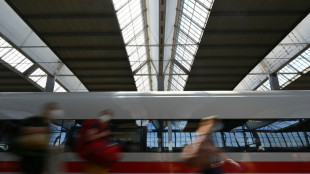 Brussels wants high-speed rail linking EU capitals by 2040
Brussels wants high-speed rail linking EU capitals by 2040
-
Swiss business chiefs met Trump on tariffs: Bern
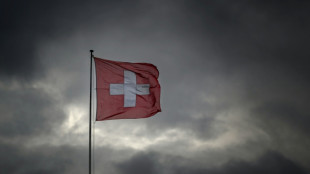
-
 Spain's exiled king recounts history, scandals in wistful memoir
Spain's exiled king recounts history, scandals in wistful memoir
-
Wall Street stocks steady after positive jobs data
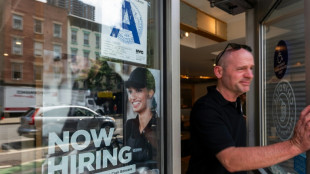
-
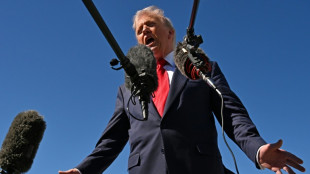 Trump blasts Democrats as government shutdown becomes longest ever
Trump blasts Democrats as government shutdown becomes longest ever
-
Indian pilgrims find 'warm welcome' in Pakistan despite tensions

-
 Inter and AC Milan complete purchase of San Siro
Inter and AC Milan complete purchase of San Siro
-
Swedish authorities inspect worksite conditions at steel startup Stegra

-
 Keys withdraws from WTA Finals with illness
Keys withdraws from WTA Finals with illness
-
Prince Harry says proud to be British despite new life in US

-
 EU strikes last-ditch deal on climate targets as COP30 looms
EU strikes last-ditch deal on climate targets as COP30 looms
-
Stocks retreat as tech bubble fears grow

-
 Shein opens first permanent store amid heavy police presence
Shein opens first permanent store amid heavy police presence
-
West Indies edge New Zealand despite Santner brilliance

-
 French pair released by Iran await return home
French pair released by Iran await return home
-
German factory orders up but outlook still muted

-
 Death toll tops 100 as Philippines digs out after typhoon
Death toll tops 100 as Philippines digs out after typhoon
-
Attack on key city in Sudan's Kordofan region kills 40: UN

-
 'No one could stop it': Sudanese describe mass rapes while fleeing El-Fasher
'No one could stop it': Sudanese describe mass rapes while fleeing El-Fasher
-
Champagne and cheers across New York as Mamdani soars to victory

-
 Medieval tower collapse adds to Italy's workplace toll
Medieval tower collapse adds to Italy's workplace toll
-
BMW boosts profitability despite China, tariff woes

-
 South Africa's Wiese wary of 'hurt' France before re-match
South Africa's Wiese wary of 'hurt' France before re-match
-
Beyond limits: Croatian freediver's breathtaking record

-
 Tottenham supporting Udogie after alleged gun threat in London
Tottenham supporting Udogie after alleged gun threat in London
-
Thunder roll Clippers to stay unbeaten as SGA keeps streak alive

-
 In appeal, Australian mushroom murderer alleges 'miscarriage of justice'
In appeal, Australian mushroom murderer alleges 'miscarriage of justice'
-
Toyota hikes profit forecasts 'despite US tariffs'

-
 Ex-France lock Willemse challenges Meafou to become 'the bully'
Ex-France lock Willemse challenges Meafou to become 'the bully'
-
Ukrainians to honour sporting dead by building country they 'died for': minister

-
 At least 7 dead after UPS cargo plane crashes near Louisville airport
At least 7 dead after UPS cargo plane crashes near Louisville airport
-
US Supreme Court hears challenge to Trump tariff powers

-
 US government shutdown becomes longest in history
US government shutdown becomes longest in history
-
India's Modi readies bellwether poll in poorest state

-
 Green goals versus growth needs: India's climate scorecard
Green goals versus growth needs: India's climate scorecard
-
Where things stand on China-US trade after Trump and Xi talk

-
 Sri Lanka targets big fish in anti-corruption push
Sri Lanka targets big fish in anti-corruption push
-
NY elects leftist mayor on big election night for Democrats

-
 Injured Jordie Barrett to miss rest of All Blacks tour
Injured Jordie Barrett to miss rest of All Blacks tour
-
Asian markets tumble as tech bubble fears grow

-
 Pay to protect: Brazil pitches new forest fund at COP30
Pay to protect: Brazil pitches new forest fund at COP30
-
Iraq's social media mercenaries dying for Russia

-
 Young leftist Trump foe elected New York mayor
Young leftist Trump foe elected New York mayor
-
Concerns at ILO over expected appointment of close Trump advisor


Tweed's youthful makeover resurrects symbol of Scottish heritage
"When you see tweed on the runway, you don't expect it to come from here," joked 38-year-old former banker Alexander MacLeod as he set up his loom in a converted barn on the shores of a Scottish loch.
MacLeod became a weaver two years ago, joining residents on the islands of Lewis and Harris, off Scotland's northwest coast, in helping to rejuvenate the tweed industry after a significant period of decline.
"It's a good thing to keep the tradition going," he told AFP.
Tweed is a symbol of Scottish heritage and has "always been part of the culture" on the Outer Hebrides, added Macleod, who hails from the island of Scalpay, which is connected to Harris by a bridge.
It's now "an attractive sector to be in", he explained.
He left the Hebrides for seven years to work in banking but the pull of his roots proved too strong.
During the day, McLeod now works for a small local cosmetics company. In the evenings, he puts on a podcast, usually about espionage, and patiently begins to weave.
Only the steady hum of his machine disturbs the calm of the old stone barn.
Harris tweed, traditionally made from 100 percent wool, is the only fabric protected by a 1993 Act of Parliament.
It must be "handwoven by the islanders at their homes in the Outer Hebrides, finished in the Outer Hebrides, and made from pure virgin wool dyed and spun in the Outer Hebrides".
- 'Resurgence' -
The weaver spoke of his "satisfaction" once the tweed is finished.
The fabric, once associated with the British aristocracy, then goes to the spinning mill for a quality control check, where the slightest flaw is flagged up.
Finally, it receives the precious "Harris Tweed" stamp -- a globe topped with a cross -- certifying the fabric's provenance and authenticity, issued by the Harris Tweed Authority (HTA).
The tweed then leaves the island to be purchased by discerning companies abroad, including luxury brands such as Christian Dior, Chanel, and Gucci.
Several sneaker brands such as Nike, New Balance, and Converse have also used it for limited edition products.
The traditional staples are jackets, caps, and bags, but the fabric can also used for furniture.
There are 140 weavers, according to the HTA, which launched a recruitment campaign in 2023 and offered workshops to learn the trade following a wave of retirements.
This know-how, often passed down from generation to generation, is now being nurtured by a different profile of weaver.
"It's nice to see younger people coming in," said Kelly MacDonald, director of operations at the HTA.
"When I joined the industry 22 years ago, there was a severe period of decline. I was wondering: 'is there going to be an industry anymore?'"
But the industry is now enjoying a "resurgence" and "significant growth", with more than 580,000 metres of tweed produced in 2024.
"We are always looking at new markets," she explained, and tweed is now exported to Korea, Japan, Germany, France and other countries.
It is no longer dependent on the US market, as it once was, and should be largely shielded from the tariffs imposed by President Donald Trump.
- Slow fashion -
Tweed has "modernised", said Cameron MacArthur, who works at Carloway Mill, one of the three spinning mills in the west of the Isle of Lewis.
He is only 29, but has already worked there for 12 years.
The mill, with its large machines, looks as if it hasn't changed for decades. But MacArthur has seen it evolve to embrace a younger workforce and newer fabrics, meaning it is no longer just the ultra-classic Prince of Wales check or dark colours that are on offer.
"Nowadays, we're allowed to make up our own colours... and we're just doing different things with it, modernising it, making it brighter," he said, showing off rolls of turquoise blue and fuchsia pink.
"We're so busy... it never used to be like that," he said, adding that he was "proud" to be working with the local product.
MacDonald also noted that tweed was an antidote to environmentally unfriendly "fast fashion."
"How nice to own a product where you can actually look on a map to a tiny island and say, that's where my jacket was made. That's so rare now, and I think people really engaged with that," he said.
"Every stage of the production has to happen here, but from start to finish, it is a really long process. We are the epitome of slow fashion."
C.Stoecklin--VB




